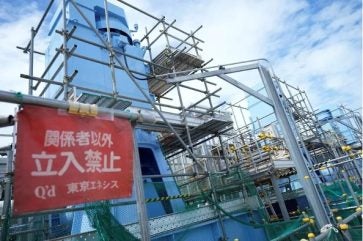
The tritium concentration in the sixth batch of treated water, which the Tokyo Electric Power Company (Tepco) began discharging on 17 May, is far below Japan’s operational limit, International Atomic Energy Agency (IAEA) experts have confirmed.
Contaminated water, used to cool the melted reactor cores in the aftermath of the 2011 nuclear disaster at Fukushima, is stored in around 1,000 huge tanks at the plant containing more than 1.3m tonnes and total storage capacity has been reached. The contaminated cooling water and groundwater is treated by the Advanced Liquid Processing System (ALPS), which removes most of the radioactive contamination, with the exception of tritium. The treated water is then stored in tanks before being diluted with seawater to one-fortieth of the concentration permitted under Japanese safety standards before being released one kilometre off the power plant.
The treated water was sampled and assessed by IAEA experts stationed at the Agency’s office at the Fukushima Daiichi NPP site. After conducting an independent on-site analysis, the IAEA confirmed that the tritium concentration in the diluted water is far below the operational limit of 1500 becquerels per litre.
Japan began discharging the ALPS-treated water NPS in batches in August 2023. The IAEA has confirmed that the tritium concentrations in the previous five batches, totalling 38,900 cubic metres of water, were far below operational limits. In this latest release, Tepco plans to discharge 7,800 tonnes of water by 4 June, totalling 54,600 tonnes this fiscal year. This operation is expected to continue for 30-40 years.
In a comprehensive report issued in July 2023, the IAEA’s safety review found that Japan’s plan for handling the treated water was consistent with international safety standards and that the release as planned would have a negligible radiological impact to people and the environment.
However, China continues to oppose the water release and has banned Japanese seafood imports since the first discharge. There I also continuing opposition from fishing communities in South Korea and Japan. The latest release of nuclear waste came a day after China and Russia criticised the water discharge policy, demanding transparent consultations with neighbouring countries and international bodies.
During Russian President Vladimir Putin recent visit to China, the two nations urged Japan to handle the water safely, under long-term supervision by the IAEA, to protect global health and the marine environment.
Japan sent a protest to Russia and China through diplomatic channels following their joint statement. “The allegations made in the joint Sino-Russian statement on the discharge of purified water are contrary to reality – this is deeply regrettable, the Secretary General of the Cabinet of Ministers of Japan, Yoshimas Hayashi told a press conference. He promised that Japan will continue to explain the country’s position on the discharge process with maximum transparency, including to Russia and China, as well as provide monitoring data for this process.
IAEA has been closely monitoring the process from the start. All reports on independent sampling, data corroboration, and analysis activities are available on the IAEA website.






